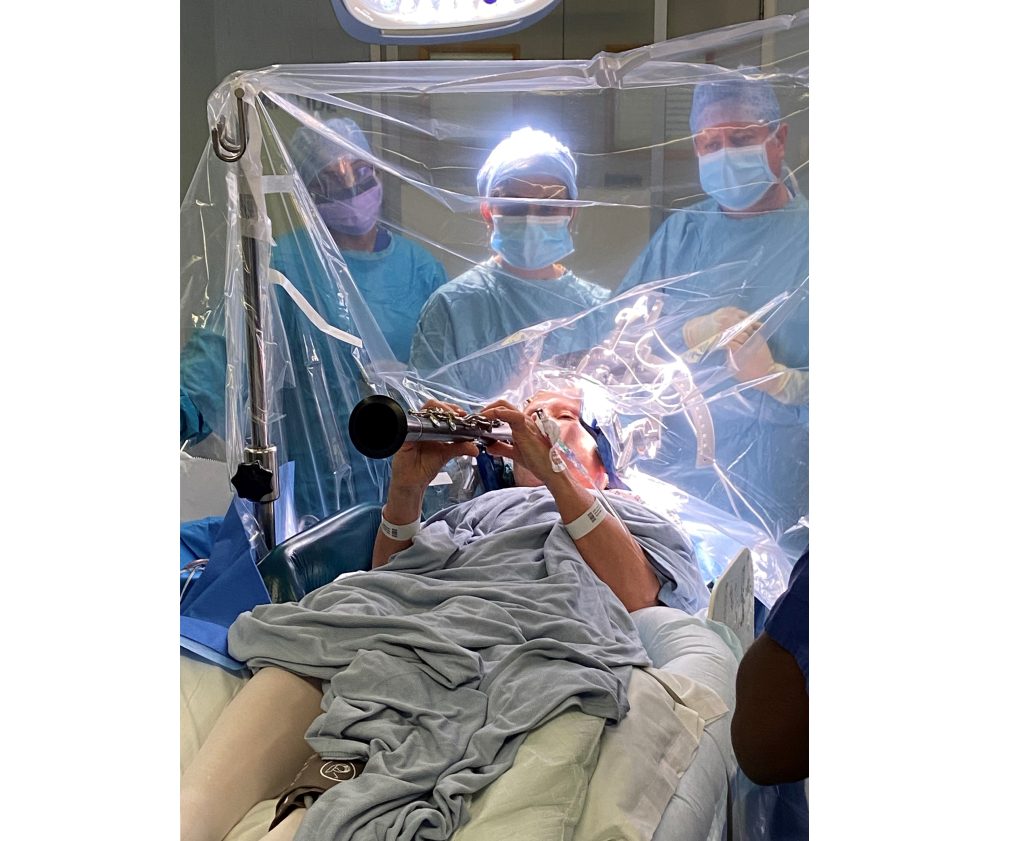Parkinson’s disease patient plays clarinet during brain operation
21 October 2025 - Instant improvement in finger movements when electrical current was delivered to the brain

A patient with Parkinson’s disease has played the clarinet while undergoing Deep Brain Stimulation to help manage her symptoms, enabling surgeons to see – and hear – immediate results.
Retired speech and language therapist, Denise Bacon, 65, from Crowborough in East Sussex, had been experiencing slowness of movement (bradykinesia) and muscle stiffness (rigidity) resulting from Parkinson’s disease, which she was diagnosed with in 2014, affecting her ability to walk, swim, dance and play her beloved clarinet.
During the four-hour operation at King’s College Hospital, Keyoumars Ashkan MBE, Professor of Neurosurgery, performed Deep Brain Stimulation (DBS) – a surgical procedure used on selected patients with treatment-resistant movement disorders such as Parkinson’s disease – to implant electrodes in Denise’s brain.
Supported by a team of specialists comprising a neurologist, neuropsychologist, as well as DBS and theatre nurses, the electrodes were connected to a pulse generator, similar to a pacemaker, to deliver electrical impulses to modify brain activity and reduce Denise’s symptoms.
The results were instantaneous on the operating table. The movement in Denise’s fingers improved immediately, allowing her to play the clarinet with much greater ease.
Professor Ashkan, said: “Deep Brain Stimulation, where stimulating electrodes are placed into the deep structures of the brain, is a long-established procedure to improve motor symptoms in patients with movement disorders.
“Holes half the size of a five pence piece were made in Denise’s skull after a frame with precise coordinates was placed on Denise’s head, acting as a sat nav to guide us to the correct positions within the brain to implant the electrode.
“Once the electrodes were in place on the left side of Denise’s brain, the current was switched on and an immediate improvement was noted in hand movements on her right side. The same happened on her left side when we implanted electrodes on the right side of her brain.
“As a keen clarinettist, it was suggested Denise bring her clarinet into the operating theatre to see whether the procedure would improve her ability to play, which was one of Denise’s main goals for the surgery. We were delighted to see an instant improvement in her hand movements, and therefore her ability to play, once stimulation was delivered to the brain.”
Amateur musician Denise, who played clarinet in the East Grinstead Concert Band until she had to stop five years ago due to her Parkinson’s symptoms, was given a local anaesthetic to numb her scalp and skull (the brain itself has no pain receptors) but remained awake during the procedure so her symptoms could be monitored throughout.
She said: “I remember my right hand being able to move with much more ease once the stimulation was applied, and this in turn improved my ability to play the clarinet, which I was delighted with.
“I’m already experiencing improvements in my ability to walk, and I’m keen to get back in the swimming pool, and on the dance floor to see if my abilities have improved there.”
Denise opted for the rechargeable type of pulse generator battery that is implanted in her chest, which can last up to 20 years before it requires replacing, delivering a continuous electrical current to her brain. The innovative generator will monitor her brain activity and can help automatically adjust the stimulation when needed.
Watch Denise play clarinet during surgery
- Audio subtitled version – https://vimeo.com/1115773043/6f86f6e08d
- Non-subtitled version – https://vimeo.com/1102246552?share=copy
